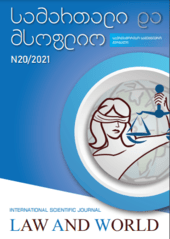The Legal Aspects of Artificial Intelligence based on the EU Experience 
##plugins.themes.bootstrap3.article.main##
Abstract
In the digital era, technological advances have brought innovative opportunities. Artificial intelligence is a real instrument to provide automatic routine tasks in different fields (healthcare, education, the justice system, foreign and security policies, etc.). AI is evolving very fast. More precisely, robots as reprogrammable multi-purpose devices designed for the handling of materials and tools for the processing of parts or specialized devices utilizing varying programmed movements to complete a variety of tasks. Regardless of opportunities, artificial intelligence may pose some risks and challenges for us. Because of the nature of AI ethical and legal questions can be pondered especially in terms of protecting human rights. The power of artificial intelligence means using it more effectively in the process of analyzing big data than a human being. On the one hand, it causes loss of traditional jobs and, on the other hand, it promotes the creation of digital equivalents of workers with automatic routine task capabilities. “Artificial intelligence must serve people, and therefore artificial intelligence must always comply with people’s rights,” said Ursula von der Leyen, President of the European Commission. The EU has a clear vision of the development of the legal framework for AI. In the light of the above, the article aims to explore the legal aspects of artificial intelligence based on the European experience. Furthermore, it is essential in the context of Georgia’s European integration. Analyzing legal approaches of the EU will promote an approximation of the Georgian legislation to the EU standards in this field. Also, it will facilitate to define AI’s role in the effective digital transformation of public and private sectors in Georgia.






